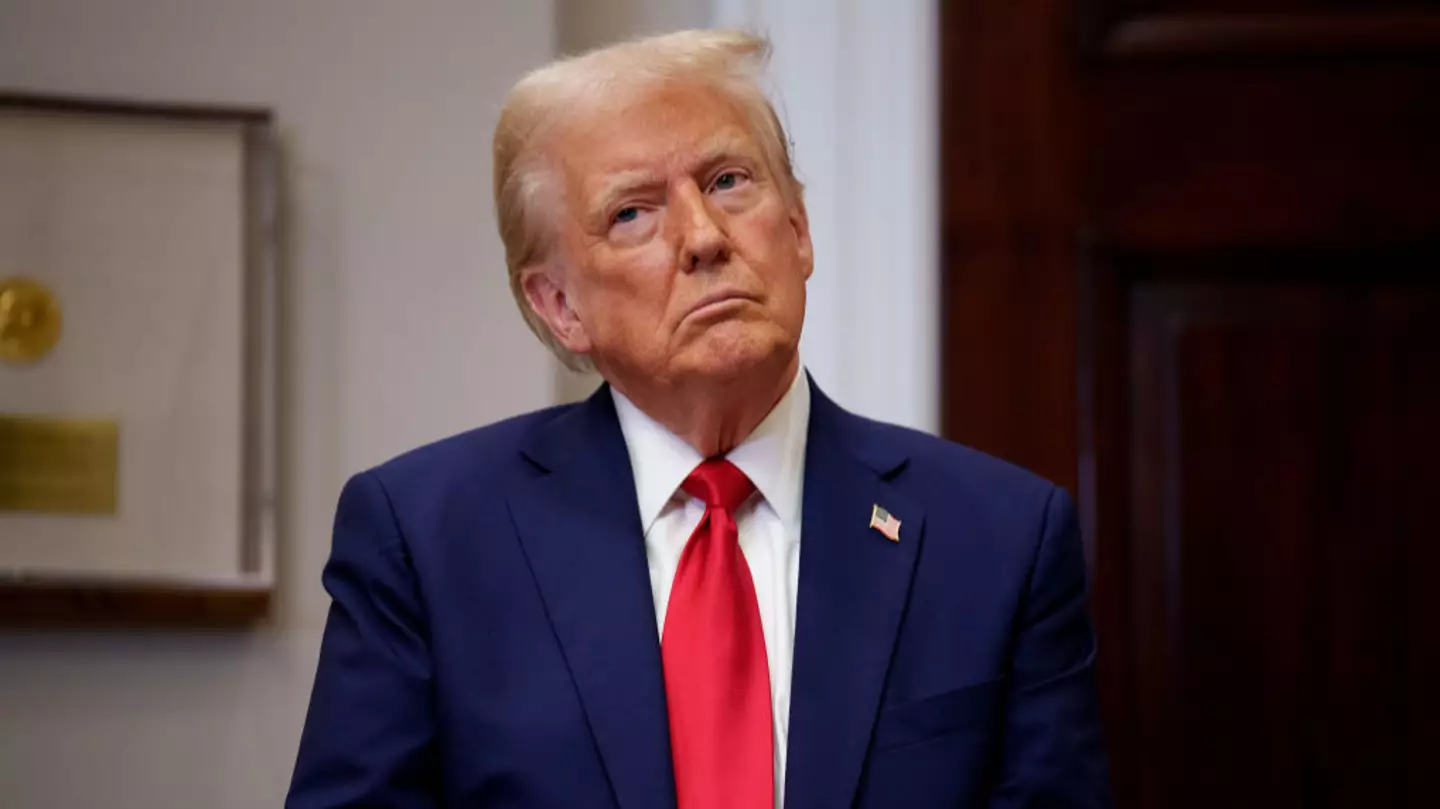A meeting between Donald Trump and Japanese Prime Minister Shigeru Ishiba went so well that Japan has pledged to invest a staggering amount of money into the US.
Ishiba took a trip to Washington D.C and met with the new POTUS yesterday (February 7), where the two leaders are said to have had discussions spanning almost two hours in their first even face-to-face meeting.
Trump and Ishiba discussed everything; from the military and security, to economics and regional affairs.
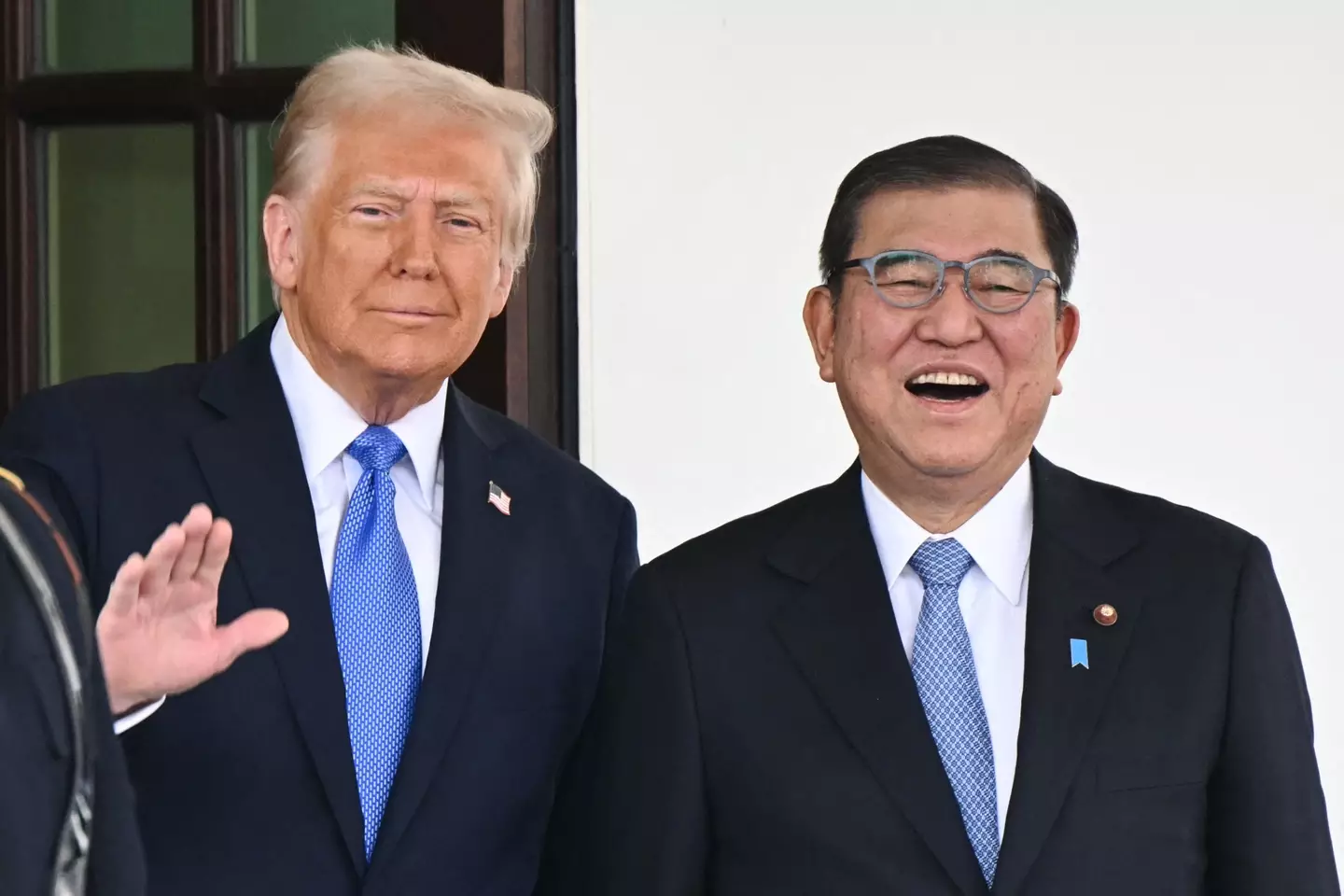

Japanese Prime Minister Shigeru Ishiba visited the White House yesterday (MANDEL NGAN/AFP via Getty Images)
The president was said to be close with the late Japanese Prime Minister Shinzo Abe, but is yet to establish a relationship with Ishiba — who took office in October 2024.
In the lengthy meeting, Ishiba pledged to invest an eye-watering $1,000,000,000,000 into the US.
Meeting notes published by the Ministry of Foreign Affairs of Japan read: “The two leaders affirmed that Japan and the US are close partners in the economic field as well, with Japan being the world’s largest investor in the US for five consecutive years.
“Prime Minister Ishiba conveyed his willingness to cooperate together to elevate Japan’s investment in the US to an unprecedented amount of one trillion dollars, and President Trump strongly welcomed such investments by Japanese companies.”
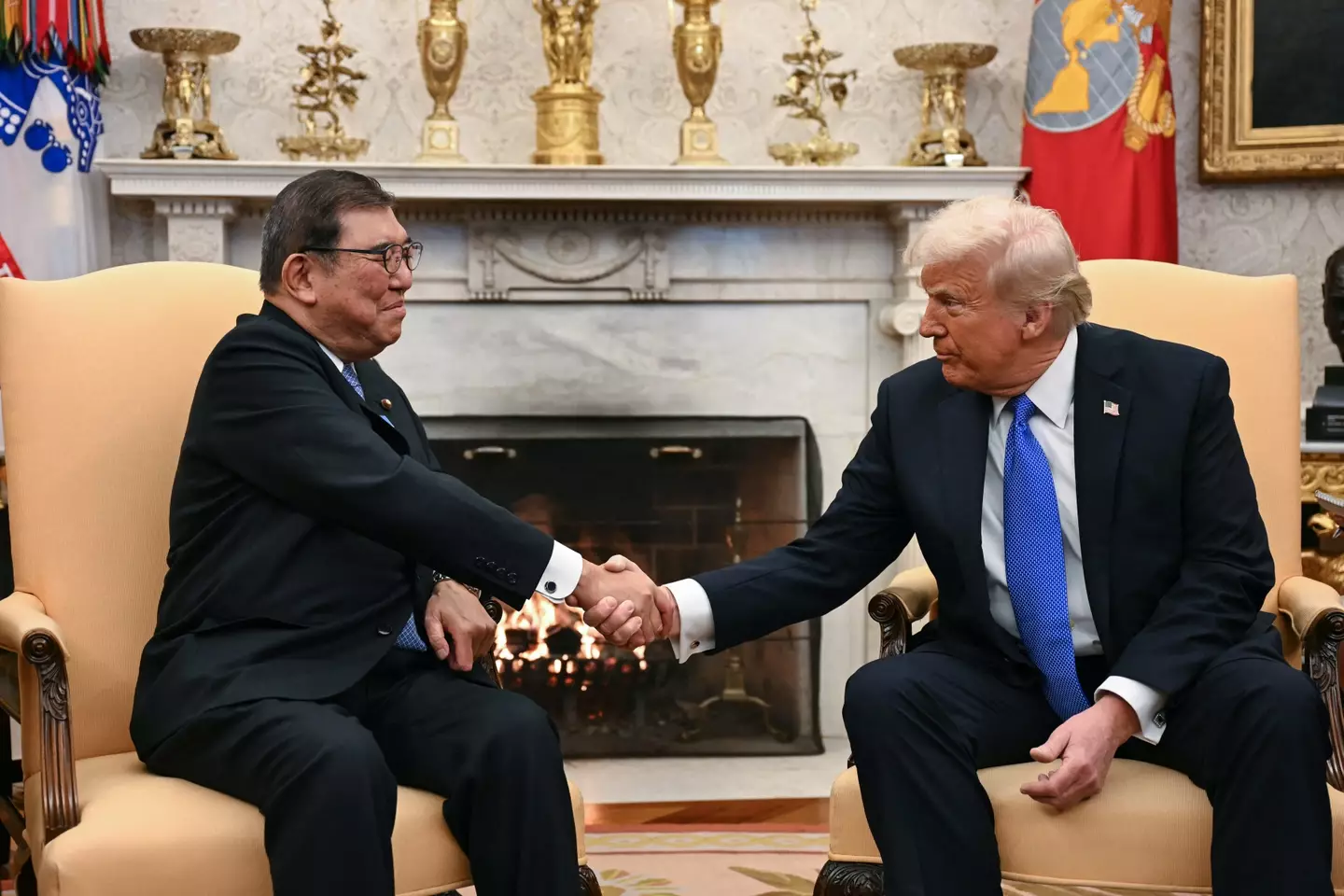

Japan has pledged to invest $1 trillion into the US (JIM WATSON/AFP via Getty Images)
As to what the money will be going towards, Trump said: “Japan is committed to double its defense spending by 2027 compared to my first term.
“They’ve invested a lot of money, $300 billion in goods and services each year. And I’m pleased to say that this week, my administration approved nearly a billion dollars in foreign military sales to Tokyo.”
He also said that Japanese car manufacturer Nissan is ‘going to be doing something very exciting about US Steel’ – a company Japan wanted to acquire for $14.9 billion.
Instead, Japan will ‘invest heavily’ in the company, BBC News reports, without taking a majority stake.
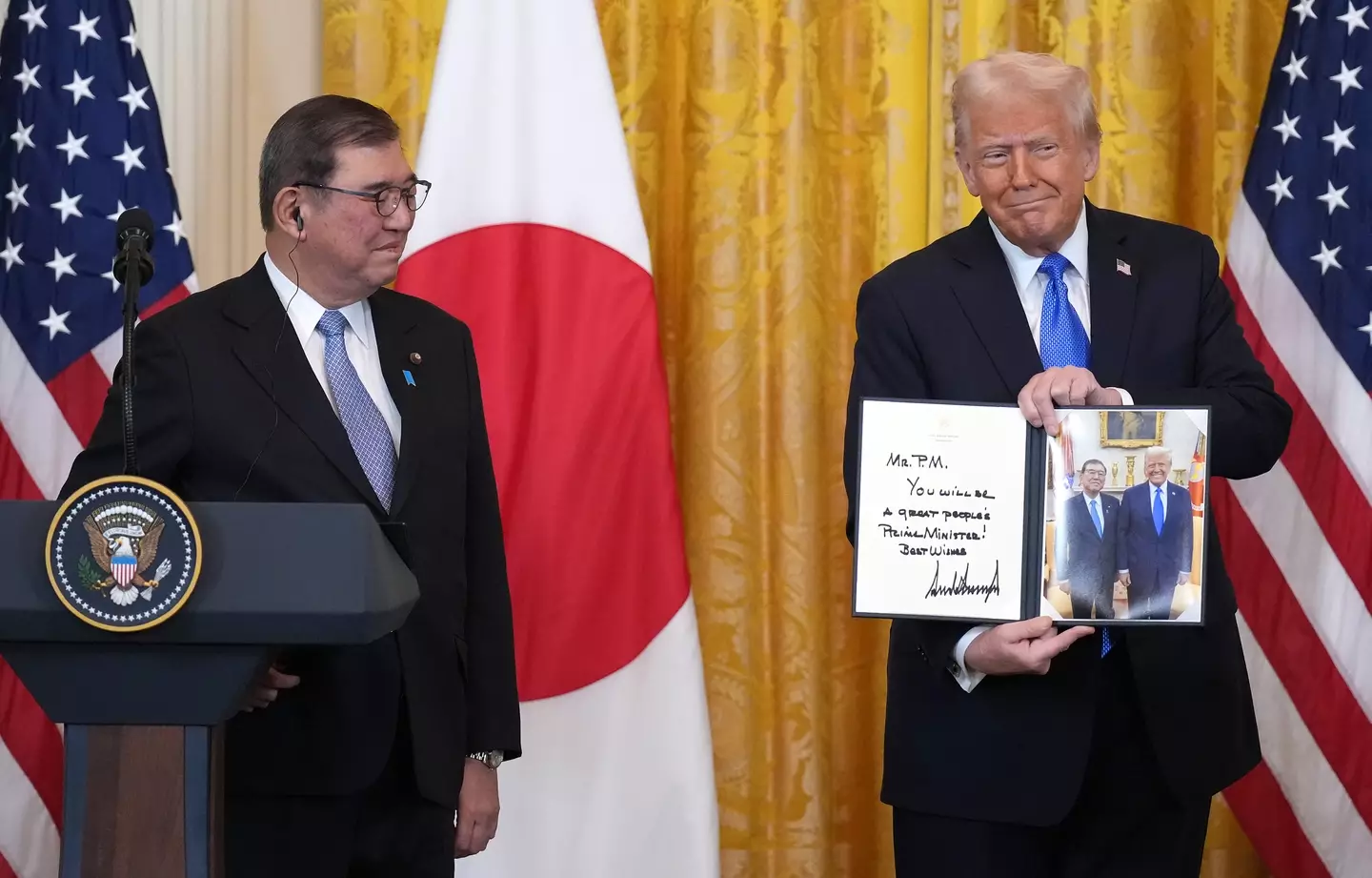

Trump is trying to create a strong relationship with Japan (Andrew Harnik/Getty Images)
While Trump strengthens his relationship with Japan, his rapport with China is somewhat strained in the wake of the new tariffs he’s imposed on the country’s goods.
The tariff has been set at 10 percent, which game into force on February 4.
In response to the change, China plans on imposing similar tariffs on US goods coming into the country.
A statement from the country read: “Because Google is suspected of violating the Anti-Monopoly Law of the People’s Republic of China, the State Administration for Market Regulation has initiated an investigation into Google in accordance with the law.”
Donald Trump is looking to impose an 18th century law last used to justify ‘internment camps’ in World War II for mass deportations.
Since his inauguration to the White House, Trump has been conjuring up new and old initiatives to crackdown on immigration in the US.
In a matter of weeks, he signed a slew of executive orders to ‘reclaim control’ of the States, hiked up tariffs to neighbors, Canada, Mexico and China to encourage their cooperation in halting illegal immigration.
He even threatened Colombia with similar sanctions for refusing to accept deportation flights, which have seemingly worked as the Colombian government allowed two planes carrying deported migrants into the country, the BBC reports.
But that’s not all.
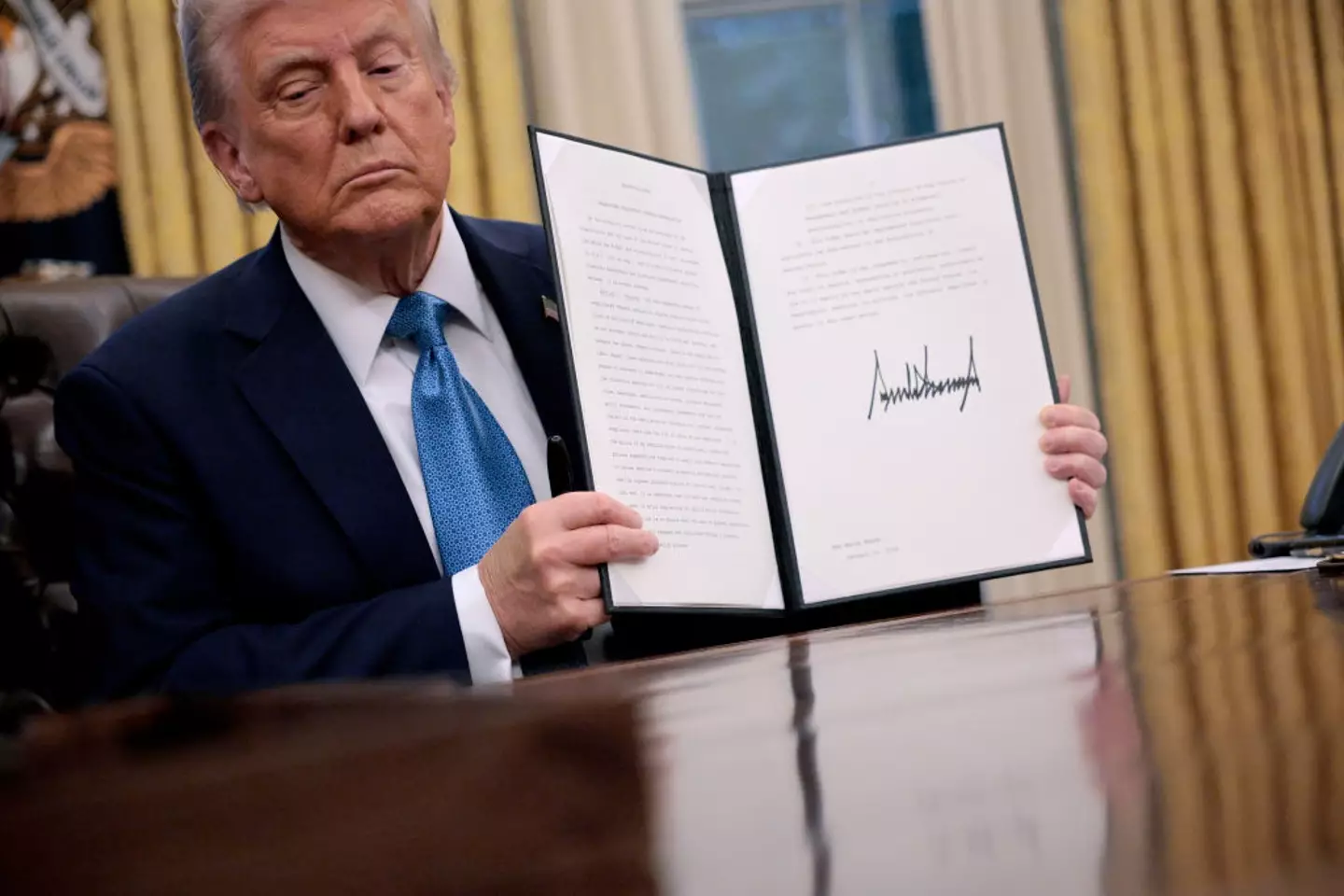

Trump signed a record-number of executive orders within days of his presidency (Chip Somodevilla/Getty Images)
He’s also looked at revoking student visas for foreign youngsters and deporting them if they are found protesting against Israel, expanding Guantanamo Bay and opening a new detention center for deportees in Colorado, and proposed another idea to exile repeat criminal offenders of any nationality, including the US, to far away lands in a ‘modern’ take on a penal colony.
Meanwhile, another executive order has sent the US military down to the Mexican border, with ‘border czar’ Tom Homan revealing that the number of deportations will be ‘steadily increasing’.
Now, Trump is reportedly planning to enact a wartime law to deport migrants who have been accused of being gang members without any court hearings taking place.
What is the 1798 Enemies Act?
The 1798 Enemies Act was commissioned in response to spying and sabotage during tensions with France at the time, The Independent says.
According to the act, it can revoked in an act of ‘declared war’ or ‘any invasion or predatory incursion’ against the US government from a foreign government.
Until the President terminates it, the Enemies Act can remain in action for however long as necessary.


Deportations such as this one to Honduras on January 31 have been flying out of the US since Trump came into power (Emilio Flores/Anadolu via Getty Images)
When was the act last used?
The act has been instigated three times in the US. The law was last used to justify internment camps for citizens of Japanese, German and Italian nationality, who were the Axis powers at the time, during the Second World War by President Franklin Roosevelt, who deemed them ‘alien enemies’.
In 1812, it was used against the British, who were required to report information such as place of residence, length of time in the US, and whether they’d applied for naturalisation, as per NPR.
While in World War I, the law was used by President Woodrow Wilson against nationals from the German Empire, Austria, Hungary, the Ottoman Empire and Bulgaria, with the National Archives (via NPR) saying 6,000 ‘enemy aliens’ – largely Germans – remained in internment camps for two years following the war’s conclusion in 1918.
How could Trump use the act against migrants?
It would allow Trump to quickly deport migrants accused of ‘invasion or predatory incursion and those deemed to be gang members, reports Reuters,
The White House confirmed last month in an executive order that it was designating criminal cartels, like the Venezuelan gang Tren de Aragua, as terrorist organizations where the law would kick-in to allow legal deportations.
However, Trump’s administration will have to grapple with the fact that immigration courts are overwhelmed with a backlog of applications, with the US Citizenship and Immigration Service (UCIS) revealing in 2023 that it had reduced it’s backlog by 10 million for the first time, with some asylum claims sometimes taking years to process.
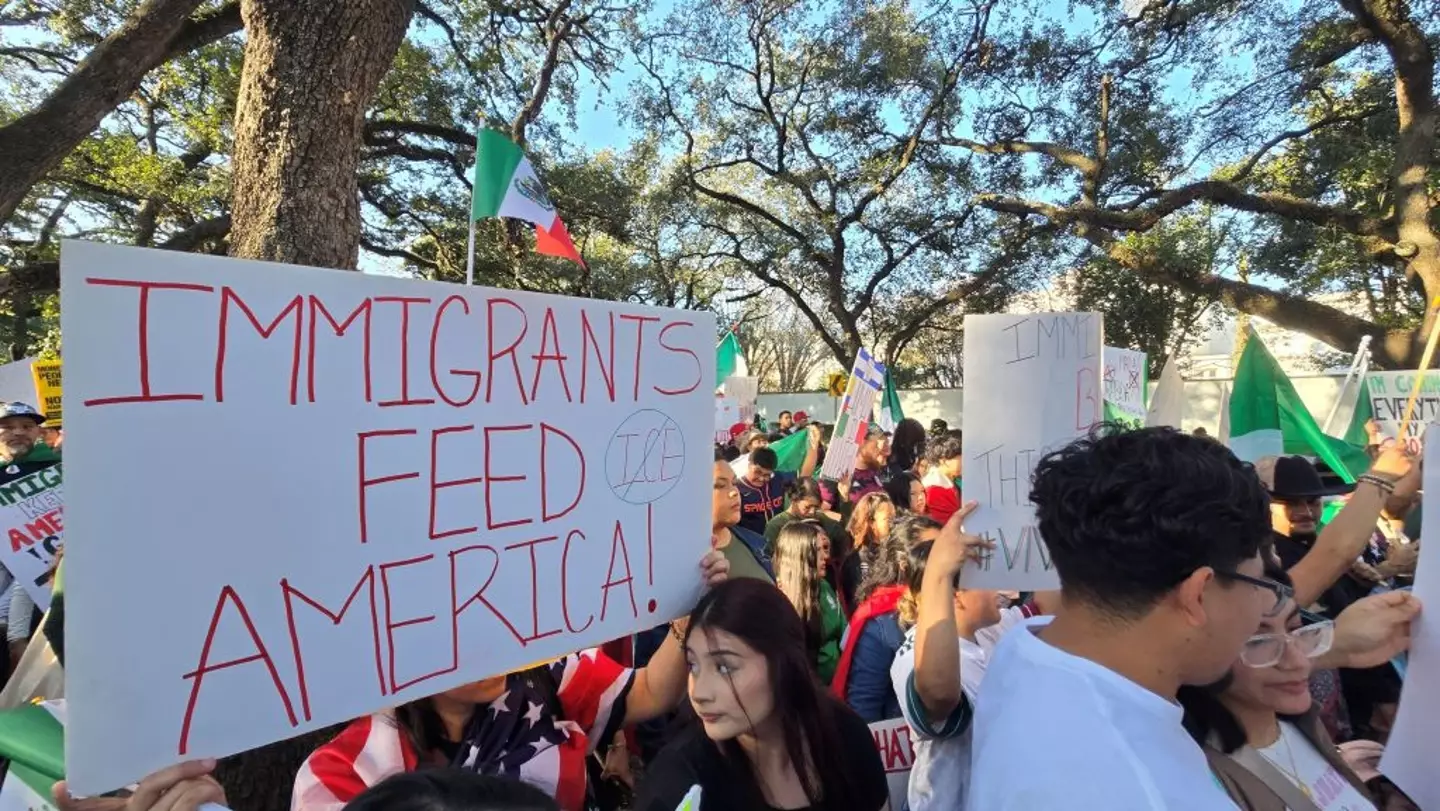

Campaigners staged a protest in support of immigration in Texas on Sunday (MOISES AVILA/AFP via Getty Images)
Trump’s vision of expedited removal for all illegal immigrants could be thwarted by this as the process can only apply to those who have been in the US for two years or less – and migrants can still lodge a claim for asylum, Reuters reports.
The Alien Enemies Act could also face legal challenges, as the court have been previously divided on decide what constitutes an ‘invasion’, according to The Independent.
Following a lawsuit against the federal government in the 1990s for allegedly failing to protect the state against an influx of illegal immigrants, courts determined there was no official standard for determining when a certain number of individuals became an ‘invasion’.
Lee Gelernt, a leading attorney with the American Civil Liberties Union (ACLU), told Reuters: “Desperate families coming to our border to seek refuge do not constitute an invasion by a foreign government within the meaning of the law.”
Donald Trump has had a busy week since he took over the White House last week.
President Trump was sworn into office for the second time on Monday (January 20) as the 47th president of the United States and it’s fair to say, he’s had a busy week.
The 78-year-old kicked off his plans for the ‘golden Age of America’ by reversing most of the work of his predecessor Joe Biden.
From 26 executive orders to presidential pardons, here’s everything Trump has done so far.


Trump has had a busy week (Anna Moneymaker/Getty Images)
Immigration
At the top of the bill is Trump’s promise to crack down on immigration, having declared a national emergency at the southern border and sent more than a thousand troops to the US-Mexico border.
Trump also ordered the construction of the border wall while suggesting the Gulf of Mexico should be renamed to the Gulf of America, which got some laughs from Hillary Clinton during his inauguration ceremony.
Beyond that, he’s asked Homeland Security to halt all refugee and asylum seekers admissions, as well as remove illegal migrants (with the term ‘illegal alien’ now reinstated).
He also tried to put an end to birthright US citizenship for the children of non-US citizens which was blocked by a federal judge in Seattle, calling it ‘blatantly unconstitutional’, reports the BBC.
Trump further threatened to prosecute officials and strip funding from sanctuary states that refuse to cooperate with deportation orders.
Gender
Trump has wasted no time in clamping down on transgender rights, too.
His order defines sex as either ‘male’ or ‘female’, which he claims are ‘not changeable and are grounded in fundamental and incontrovertible reality’.
This means transgender people won’t be able to change their legal documents to reflect their gender, for instance on passports.
The State Department has already ordered all applications from people to change their gender on passports, or to replace it with an ‘x’ marker, to be suspended.
TikTok
The President pretty much immediately suspended the proposed TikTok ban with hopes to strike a deal with the company.
The social media giant has been granted a 75-day extension to find an American buyer.
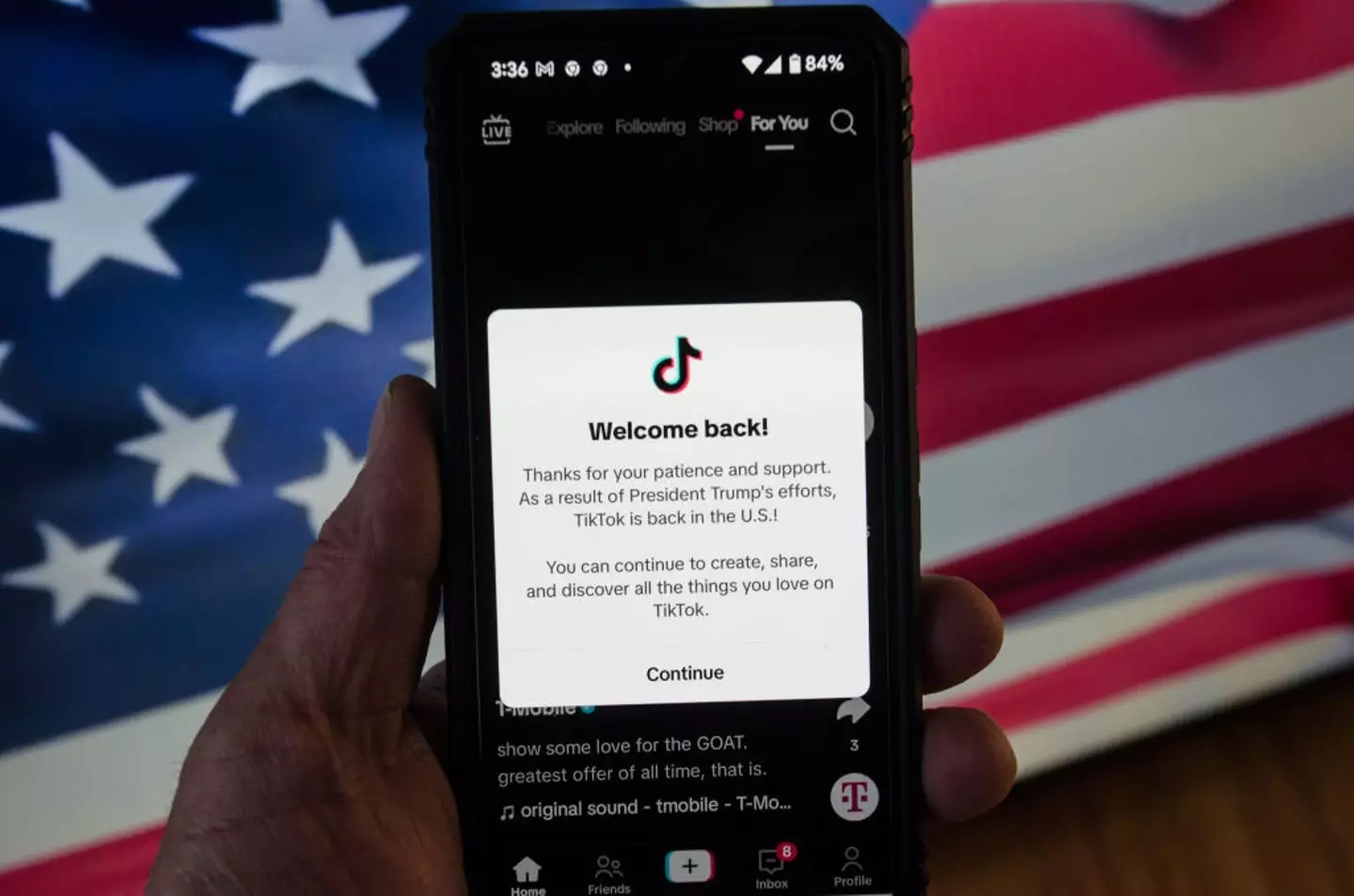

TikTok was restored almost immediately (Jacek Boczarski/Anadolu via Getty Images)
Diversity
Another controversial move out of the White House this week has been the scrapping government diversity, equality and inclusion (DEI) programs which were designed to protect workers from discrimination on the basis of race, color, religion, sex, sexual orientation, gender identity, or national origin.
He revoked the Executive Order 11246, established in 1965, and ordered employees working on diversity, equity and inclusion (DEI) initiatives in the Department of Labor to be put on paid leave while their work was shut down.
Advocates for DEI initiatives have long argued it presents a level playing field for underrepresented minorities such as LGBTQ+ people, but Trump’s order slammed the programs as ‘illegal discrimination and preferences’ and said they would be scrapped to ‘restore merit-based opportunity’.
He’s also slammed the brakes on working from home practices for federal workers and has frozen almost all federal agencies from hiring, apart from military, immigration enforcement, national security and public safety jobs.
Presidential appointees fired – and the WHO
Trump has promised on Truth Social to fire more than 1,000 presidential appointees from the previous administration.
The president said those in the firing line are ‘not aligned with our vision to Make America Great Again’, including retired Army general Mark Milley, who was fired from the National Infrastructure Advisory Council.
Trump also withdrew the US from the World Health Organization (WHO), claiming it ‘mishandled’ the pandemic.
Presidential pardons
Hundreds of people were pardoned by the president last week, including the almost 1,600 people charged in connection with the January 6 riot at the Capitol, 23 anti-abortion protesters and two Washington DC Police officers, Andrew Zabavsky and Terence Sutton, convicted for the death of a Black man during a police car chase in 2020.
However, the biggest name to receive a pardon is Ross Ulbricht, a 40-year-old tech pro from Texas who created and operated the darkweb market website, Silk Road, from 2011 up until his arrest in 2013 and conviction two years later.
Declassified files
Trump declassified files about the assassinations of John F. Kennedy and Dr Martin Luther King Jr and further files about Robert Kennedy.
Capital punishment
Trump outlined a commitment to seek the death penalty for federal crimes that involve the murder of law enforcement or in cases where an illegal migrant commits a capital crime.
Anti-abortion
Trump has made several anti-abortion moves already, such as restoring the Mexico City Rule, which bans federal funding to any overseas nongovernmental organization that performs abortions.
While he praised the annual ‘March for Life’ rally, he made a statement ‘strongly’ supporting the Born-Alive Survivors Protection Act and shut down the Biden administration’s pro-abortion government website.
He also restored the Hyde Amendment, which stops taxpayers from paying for abortions.
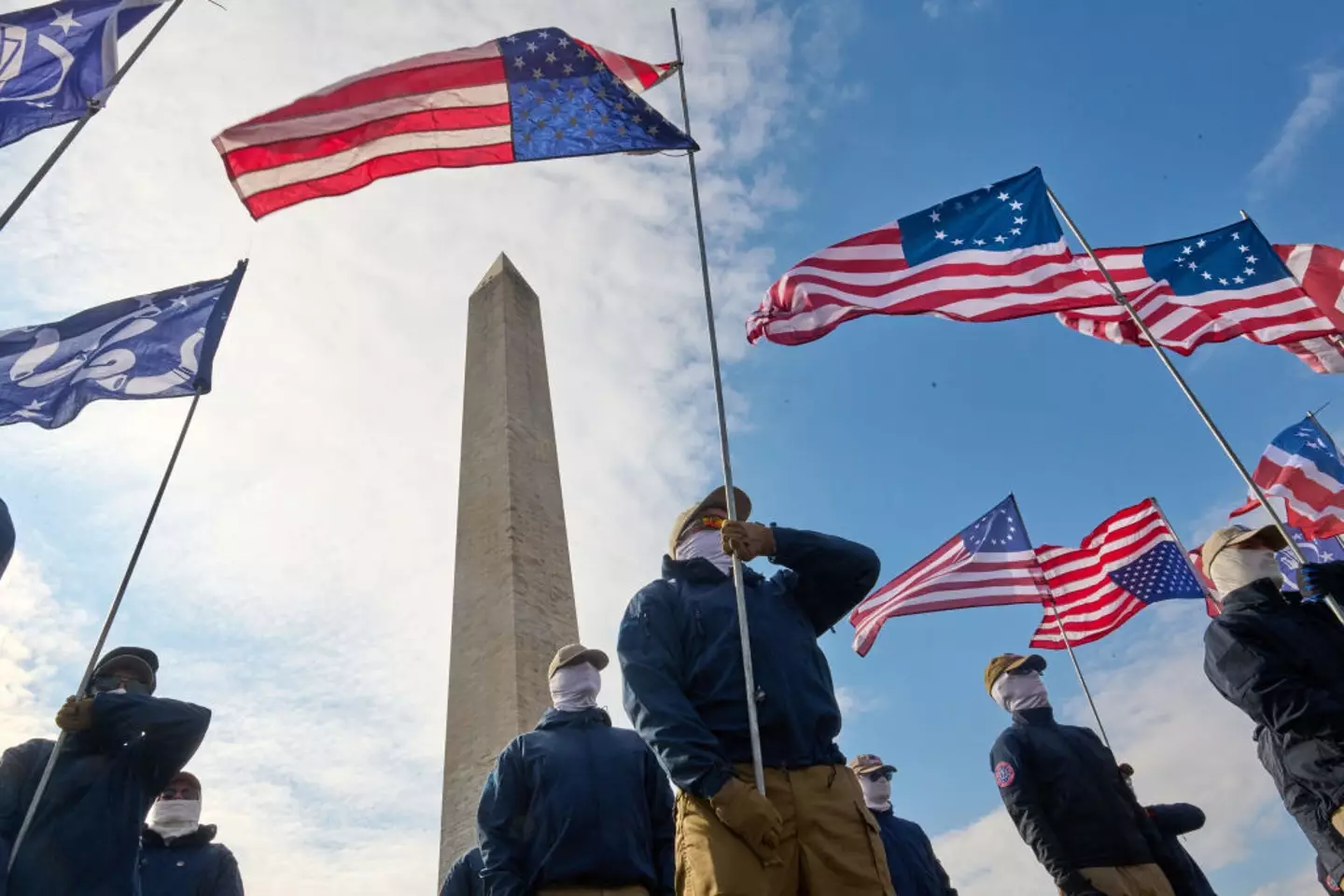

He said only American flags will be used in US embassies (DOMINIC GWINN/Middle East Images/AFP via Getty Images)
Flags
Trump is also taking a stand against flags, having issued guidance that US embassies should fly only the American flag.
The notice comes after activist flags like Black Lives Matter and the LGBTQ+ Pride flag flew over government buildings during Biden’s term.
Climate change and energy
The President declared a national energy emergency and ordered the US to withdraw from the Paris Climate Agreement, which saw almost 200 countries sign the legally binding treaty on climate change in 2015.
While most countries are trying to move away from oil and gas as sources of energy with climate change in mind, Trump has signed orders aiming to promote the the two things in Alaska.
“We will drill, baby,” Trump said in his inaugural address on Monday.
“We have something that no other manufacturing nation will ever have – the largest amount of oil and gas of any country on Earth, and we are going to use it. We’re going to use it.”
If that’s not enough, he also tore up the electric vehicle mandate and announced plans to get rid of regulations on household items like lightbulbs, water heaters and washing machines.
Economy and foreign relationships
One executive order looks to deliver emergency cost relief to Americans in the housing and healthcare sectors with a view to cut back on climate policies and create more jobs.
In line with his ‘America First’ trade policy, which looks at collective revenue related to foreign trade, Trump also ordered to pause assistance to foreign countries for 90 days.
Trump spoke to several foreign leaders, including one such ‘fiery’ call with the Danish prime minister on national security concerns, and others like the El Salvadoran President about illegal immigration.
He also called on Putin to ‘stop this ridiculous war’ in Ukraine – or Russia would face sanctions.
Trump also said Canada could joint the US as a state.
President Donald Trump has fired Justice Department lawyers who worked on bringing two criminal cases against him.
It’s been a little more than a week since Trump took his oath of office as the 47th president of the United States on Monday (January 20) and he’s been rather busy, with dozens of executive orders, presidential pardons and policy ideas flying out of the White House.
He sacked more than 1,000 government workers and presidential appointees within hours of his presidency and tore up diversity, equality and inclusion (DEI) programs with it, while staff in the Department of Labor responsible for the initiatives were placed on paid leave.
Announcing his plans to ‘Make America Great Again’ on his Truth Social platform, Trump named some of the employees he was letting go and even drew on his old The Apprentice catchphrase as he did so.
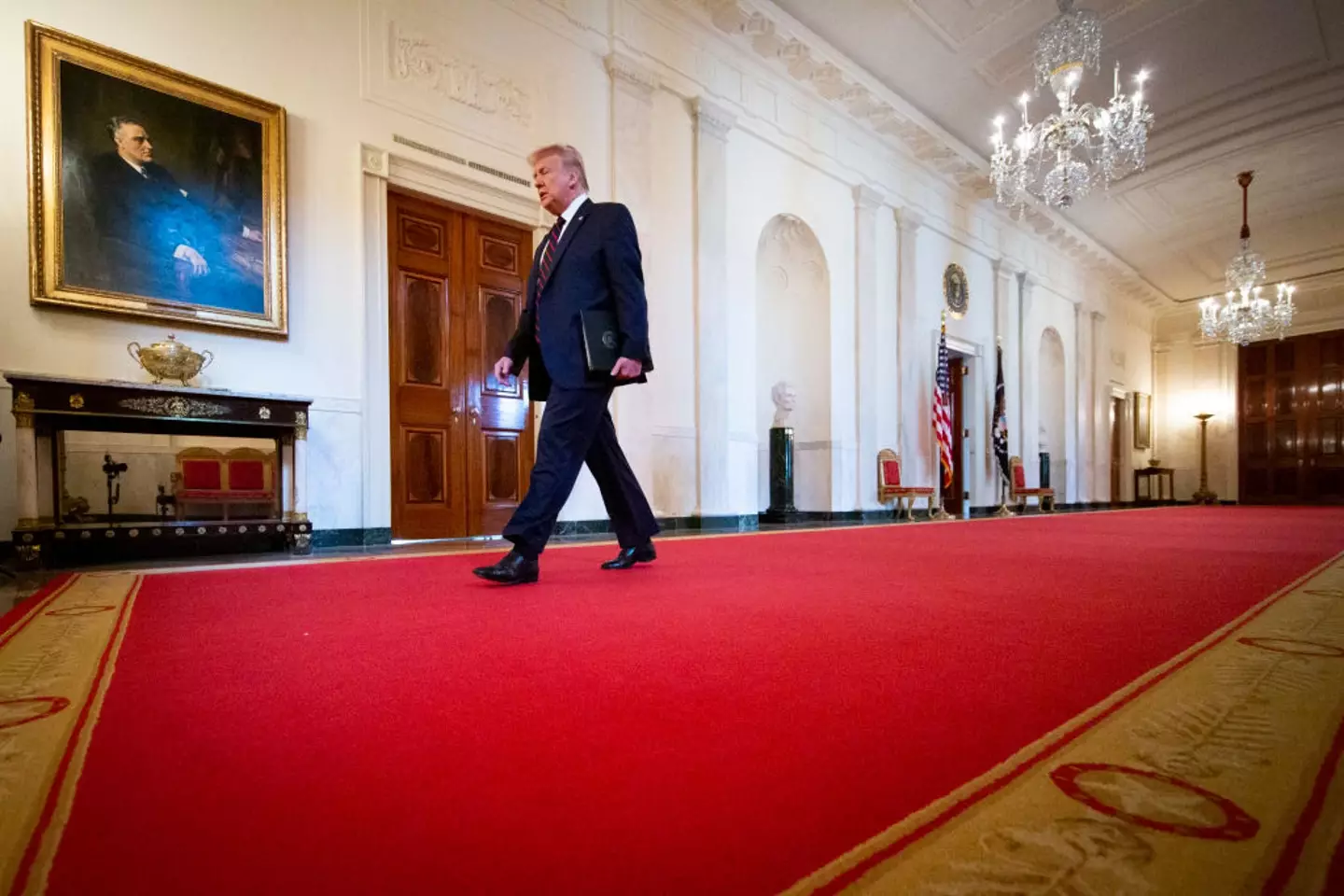

Donald Trump has made several changes since taking back the White House last week (Drew Angerer/Getty Images)
The post read: “Let this serve as Official Notice of Dismissal for these 4 individuals, with many more, coming soon.
“Jose Andres from the President’s Council on Sports, Fitness and Nutrition, Mark Milley from the National Infrastructure Advisory Council, Brian Hook from the Wilson Center for Scholars, and Keisha Lance Bottoms from the President’s Export Council – YOU’RE FIRED!”
Now, Trump is turning his attention to the justice department team who’d worked on investigating his alleged mishandling of classified documents and of his alleged attempt to overturn his election defeat in 2020.
Jack Smith was appointed special counsel in 2022 to lead his team to investigate the cases which both resulted in criminal charges being brought – to which Trump plead not guilty.
However, the charges were later dropped in November after Trump’s election win, as regulations prohibit the prosecution of a sitting president.
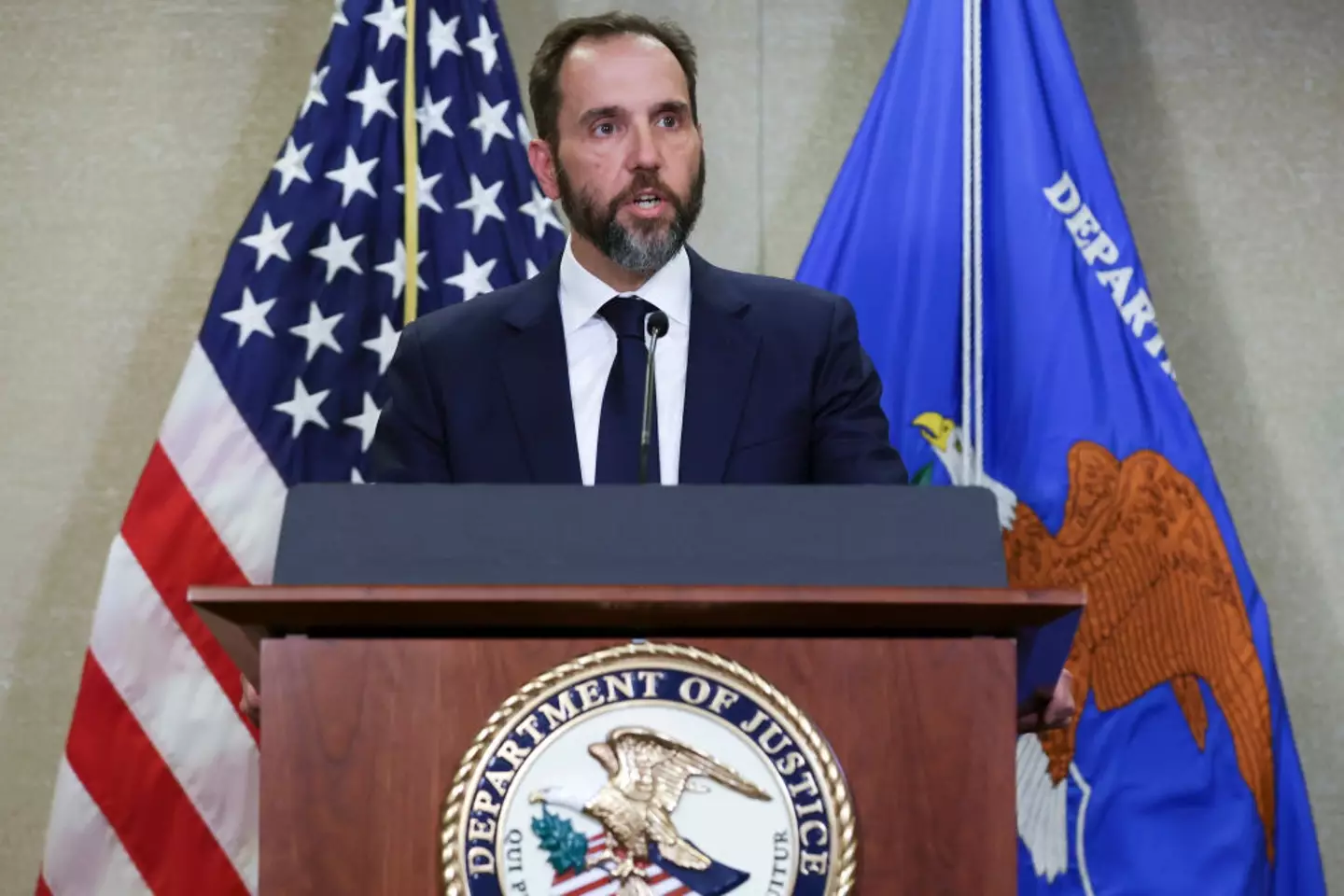

Jack Smith resigned from his role before the president could fire him (Alex Wong/Getty Images)
Mr Smith has maintained his professional integrity, writing in the final draft of his report (via the BBC): “The claim from [Trump] that my decisions as a prosecutor were influenced or directed by the Biden administration or other political actors is, in a word, laughable.”
The POTUS pledged to fire Mr Smith ‘within two seconds’ of taking his oath – but he beat him to it and quit before Trump’s inauguration ceremony.
Yesterday (Monday, January 27), Trump fired more than a dozen of attorneys, which a justice department official told CBS News that Acting Attorney General James McHenry concluded they couldn’t ‘be trusted to faithfully implement the president’s agenda because of their significant role in prosecuting the president’.
It remains unclear which members of Mr Smith’s team have been sacked, but many worked in career corruption or as national security prosectors.
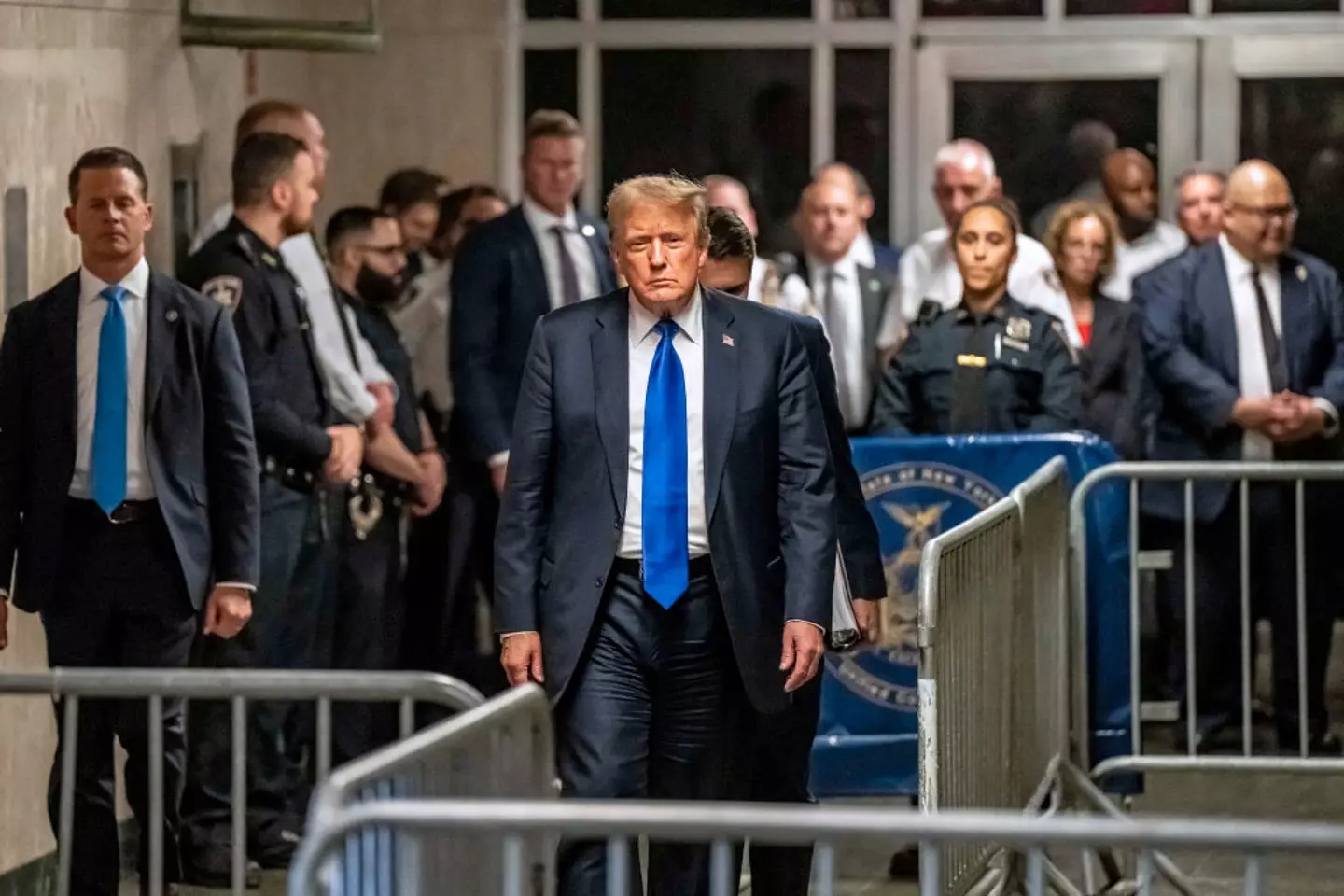

Trump’s charges were dropped (MARK PETERSON/POOL/AFP via Getty Images)
BBC News further reports that staff received their notice on Monday, which outlined how their involvement in investigating and prosecuting the president made them unfit to work in the government department.
Commenting on the matter, former US Attorney Joyce Vance said to NBC News: “Firing prosecutors because of cases they were assigned to work on is just unacceptable. It’s anti-rule of law; it’s anti-democracy.”
But Trump and his supporters have long accused the justice department of pursuing a political agenda against him.
During his re-election campaign, he said the department has been ‘weaponised’ against him, with Pam Bondi, his nominee to lead the department, also agreeing that federal prosecutions mounted to political persecution.
The latest firings come as the justice department has already had a major overhaul and reassignments amongst its top officials, which saw the chief if public integrity section reportedly resign.
Meanwhile, CBS also reported Washington DC’s top federal prosecutor has also revealed an internal review will be launched to assess the charges brought against 200 of the January 6 Capitol rioters, some of whom have received a presidential pardon from Trump.
President Donald Trump has signed a slew of executive orders since reclaiming control of the country, and a fleet of those take aim at the millions of illegal immigrants living in the US.
The Republican put pen to paper on an order that will see those living in the nation without the proper papers will be deported, with the process having already began.


President Donald Trump has taken aim at those living in the US illegally (Jim Lo Scalzo/EPA/Bloomberg via Getty Images
Who is the US’ ‘border czar’?
Firstly, let’s clear up what it means – a czar is person appointed by government to advise on and coordinate policy in a particular area.
Former US Immigration and Customs Enforcement (ICE) director Tom Homan was anointed the ‘border czar’ for the Trump administration, soon after the 47th president discovered he’d be moving back into the White House.
Now, speaking to ABC News, the 63-year-old confirmed that following Trump’s signature on a string of executive orders to do with foreigners settling down in the country, any resident who is in the US illegally is ‘on the table’ for deportation.
Homan explained how the military have been deployed to help out at the Mexican border, and how Trump is ‘sending a strong signal to the world, our border’s closed’.


Border czar Tom Homan spoke about deporting illegal immigrants in lengthy ABC interview (Chip Somodevilla/Getty Images)
Tom Homan on deporting illegal immigrants
Co-anchor of This Week, Martha Raddatz replied: “So, is this what we will see every single day, ending in what the president has promised is millions and millions being deported?”
Homan responded: “Yes. But you’re going to see the numbers steadily increase, the number of arrests nationwide as we open up the aperture. Right now, it’s concentrating on public safety threats, national security threats. That’s a smaller population.
“So, we’re going to do this on priority base, that’s President Trump‘s promise. But as that aperture opens, there’ll be more arrests nationwide.”
He continued: “If you’re in the country illegally, you’re on the table, because it’s not OK to, you know, violate the laws of this country. You got to remember, every time you enter this country illegally, you violated a crime under Title Eight, the United States Code 1325, it’s a crime.
“So, if you’re in a country illegally, you got a problem. And that’s why I’m hoping those who are in the country illegally, who have not been ordered removed by the federal judge, should leave.”


Trump has signed a slew of executive orders since taking control of the Oval Office (Anna Moneymaker/Getty Images)
Executive order: ‘Protecting American people against invasion’
The order accuses Biden’s administration of letting ‘millions of illegal aliens’ cross the borders.
“Many of these aliens unlawfully within the United States present significant threats to national security and public safety, committing vile and heinous acts against innocent Americans. Others are engaged in hostile activities, including espionage, economic espionage, and preparations for terror-related activities.” it says.
“Many have abused the generosity of the American people, and their presence in the United States has cost taxpayers billions of dollars at the Federal, State, and local levels.
“Enforcing our Nation’s immigration laws is critically important to the national security and public safety of the United States. The American people deserve a Federal Government that puts their interests first and a Government that understands its sacred obligation to prioritize the safety, security, and financial and economic well-being of Americans.”

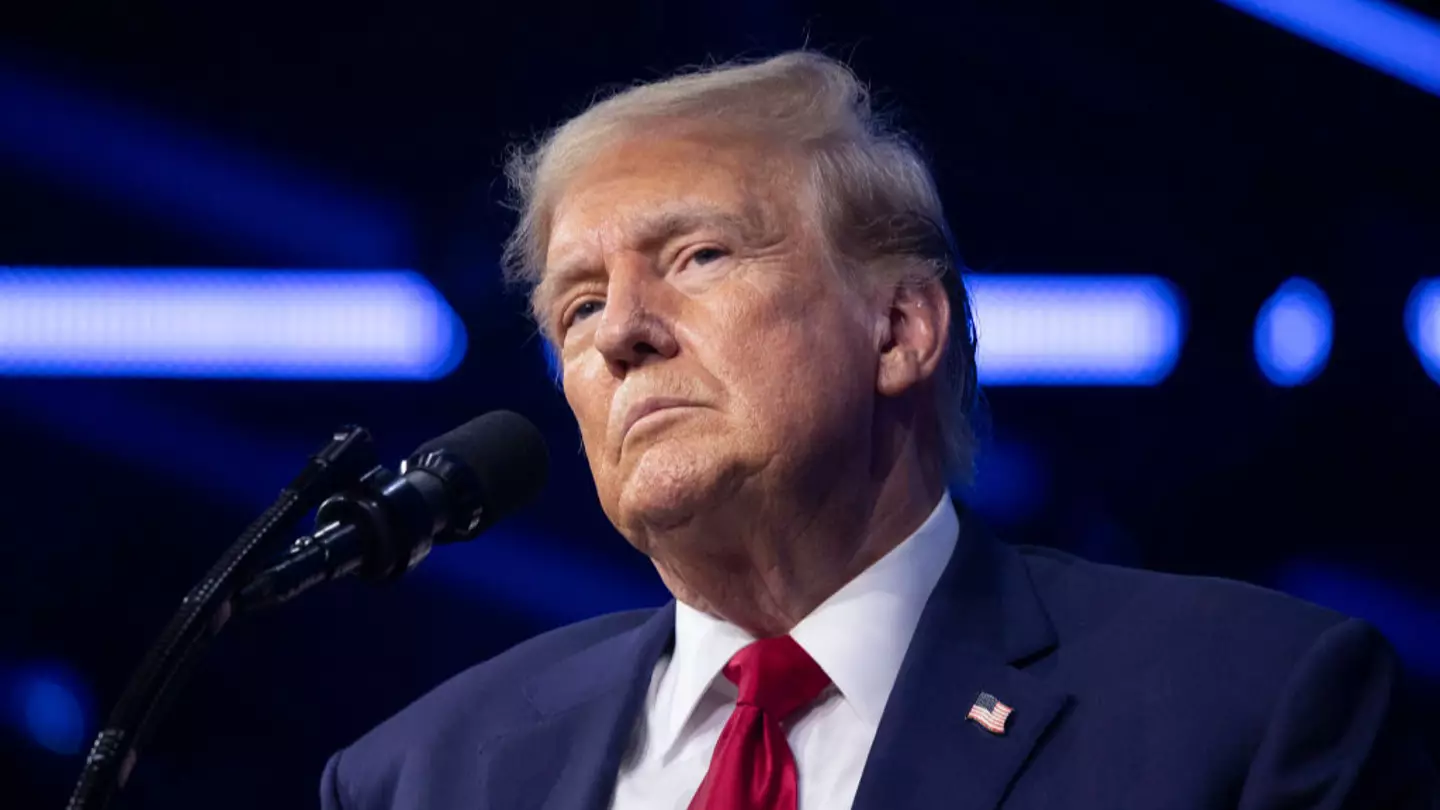

.jpg)
.jpg)
